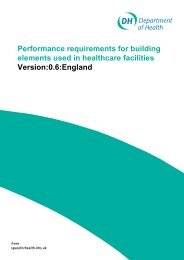Early Life Nutrition and Lifelong Health - Derbyshire Local Medical ...
Early Life Nutrition and Lifelong Health - Derbyshire Local Medical ...
Early Life Nutrition and Lifelong Health - Derbyshire Local Medical ...
Create successful ePaper yourself
Turn your PDF publications into a flip-book with our unique Google optimized e-Paper software.
BMA Board of ScienceDeveloping country perspective on complementary feedingPoor-quality complementary feeds are the norm for infants in disadvantaged families <strong>and</strong> amajor cause of infant stunting. Programmes to support breastfeeding, promote bettercomplementary feeding <strong>and</strong> supply micronutrient supplements, are some of the most effectivemeasures that could be taken to reduce undernutrition in these countries. 123Guidelines on infant feedingBreastfeeding guidelinesIn 2003, the World <strong>Health</strong> Organisation (WHO) recommended that all babies should be exclusivelybreastfed for the first six months of life (the previous recommendation was four to six months).Thereafter complementary feeding should be introduced, with breastfeeding continuing as long aspossible up to two years. The evidence underlying the advice to extend exclusive breastfeedingfrom four to six months is persuasive in developing countries, but less so for high-incomecountries. 143-145 Breastfed babies, even in high-income countries, experience significantly fewerepisodes of gastro-intestinal <strong>and</strong> respiratory infection. 146 Benefits to the mother of breastfeedinginclude convenience, less expense, a faster return to pre-pregnant weight, delayed onset ofovulation, <strong>and</strong> possibly long-term protection against breast <strong>and</strong> ovarian cancer. 147Key messageBreastfed babies, even in high-income countries, experience significantly fewer episodes ofgastro-intestinal <strong>and</strong> respiratory infection compared with formula-fed babies.The National Service Framework for Children, Young People <strong>and</strong> Maternity Services highlights theimportance of breastfeeding, <strong>and</strong> recognises that it is a skill that needs to be taught <strong>and</strong>supported. The DH produces a booklet for health professionals on how best to do this entitledGood practice <strong>and</strong> innovation in breastfeeding. 148More recently NICE 149 have produced guidance on improving the nutrition of pregnant <strong>and</strong>lactating mothers from lower socio-economic groups as a way of targeting those most in need ofadvice <strong>and</strong> support.Maternal diet during lactation guidelinesFor most women in the UK, a normal healthy diet is adequate to support breastfeeding. The FoodSt<strong>and</strong>ards Agency (FSA) provides specific dietary advice for lactating mothers. 150 Vitamin Dsupplements (10 micrograms daily) are recommended. Mothers are advised that fish is good fortheir own health <strong>and</strong> for the development of the baby, but to limit the intake of oily fish to twoportions per week because of mercury levels. If there is a family history of peanut allergy, womenare advised to avoid eating peanuts during lactation. 15034<strong>Early</strong> life nutrition <strong>and</strong> lifelong health



